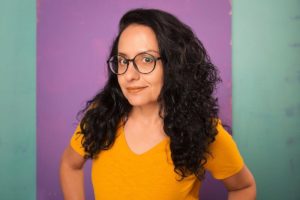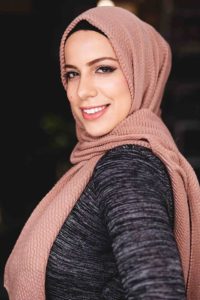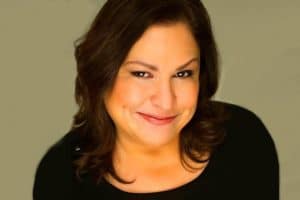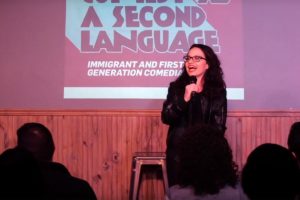Immigrant comedians crack up Canadians — and stereotypes
The immigration experience may not seem like comedy gold — unless, perhaps, you’re an immigrant and you happen to be a comedian.
Integrating into a new society can be a real struggle. Having to navigate a culture that may be very different from one’s home country, perhaps communicating in a second, third, or fourth language, puts people in a vulnerable— yet potentially hilarious— position that is not only relatable to immigrants but anyone who has ever felt like a fish out of water.
“With the storytelling, we can connect more, we know ourselves more,” Carol Zoccoli told an audience while hosting her immigrant comedy show in Toronto called Comedy as a Second Language. “We are here to build this culture together—right? And make fun of white people, of course.”
Zoccoli, who moved to Toronto from São Paulo, Brazil, saw the need for an immigrant-specific show shortly after hopping the Equator for Canada.

Submitted: Carol Zoccoli
“I noticed that a lot of immigrants— they don’t have any cultural stuff to do but restaurants,” Zoccoli told CIC News, “The entertainment they watch is their own TV [programs] in their own language.”
She wanted to create a show that would help newcomers integrate and feel like they are a part of the culture of the city.
“Because if you don’t feel like you are a part of the culture, you won’t feel like you are a part of the city,” she said.
So in 2017, she created Comedy as a Second Language, a show that features the talents of first and second-generation immigrant comedians and is now a regular feature at the John Candy Box Theatre.
The show features a selection of professional comedians, and every once in awhile a big-name headliner like Martha Chaves.
“I think it’s important to give a platform to comedians who don’t get it somewhere else and to make them grow,” Chaves told CIC News.
Chaves, who started her comedy career in Montreal in the mid-1990s, says she “grew in the wild” where she was one of the only comedians who had an accent.
Much like Zoccoli, Chaves also practised stand-up comedy to improve her English. Both of them also found that their accents turned out to be their strengths on stage, not weaknesses.
“People told me it was going to hinder me, that it would be a huge obstacle in my career,” Chaves said. “As it turns out, it has been a blessing.”
Salma Hindy has also made repeat appearances at Comedy as a Second Language.

Submitted: Salma Hindy
Hindy, who wears a hijab, is known for recounting the hilarious anecdotes from her everyday life. Much of the time her jokes challenge the absurdity of stereotypes and are free of profanity and obscenities.
“I feel like my life is a joke. It is so easy to turn into material,” Hindy told CIC News. “My first ever set I was talking about my parents and how we had a strict upbringing.”
Hindy’s parents are immigrants from Egypt who were so scared that their children would lose their culture that they refused to celebrate Halloween.
She recalled how they barricaded the house while children dressed in costume went out trick-or-treating.
“[My father] would rather fake our own deaths than make people think we’re celebrating their satanic holiday,” Hindy said with a laugh.
Though she started off her comedy career thinking she was making jokes for non-Muslims, Hindy eventually found it was the opposite. She was telling her jokes, sharing her stories, for other Muslim women so they would not feel alone in their struggles.
“I want you to know you’re not the only one,” Hindy said. “Especially because dating and things are so taboo in the Muslim community, so everyone thinks they’re the only one going through it ...Comedy is a gigantic stage of information sharing.”
Chaves found that telling jokes as a lesbian woman of colour put her in a position to represent the intersections of race and homosexuality.

Submitted: Martha Chaves
“My main mission is to be funny,” Chaves said. “But unfortunately, or fortunately, I haven’t been able to be funny like Jerry Seinfeld. I have been given a platform and I represent. I represent women, gays, and ethnic people.”
She said she has been called an “inspiration” by audience members. She has also had bigots claim that she “transformed” them and offer her non-complements like “I didn’t like women comedians, I didn’t like Spanish people, but since I heard you I changed my mind.”
Inadvertently, her humour provides a pathway to connecting people who might otherwise have never crossed paths.
Canadians who haven’t experienced life as an immigrant also find humour in her experiences.
“People love fish out of water,” Chaves said. “People love to hear a ‘back in my country’ or ‘my parents talk like this.’”
Zoccoli added that the enjoyment Canadians get out of immigrant humour comes from seeing their own country’s quirks from an outsider’s perspective.
“I believe with funny stories we can celebrate the joy of being an immigrant,” she said.
“I am happy a lot of Canadians come to watch the show. They don’t have any immigration-related experience … and they want to hear our stories— and that is really great.”
Find out if you are eligible for any Canadian immigration programs
© 2019 CIC News All Rights Reserved
- Do you need Canadian immigration assistance? Contact the Contact Cohen Immigration Law firm by completing our form
- Send us your feedback or your non-legal assistance questions by emailing us at media@canadavisa.com








